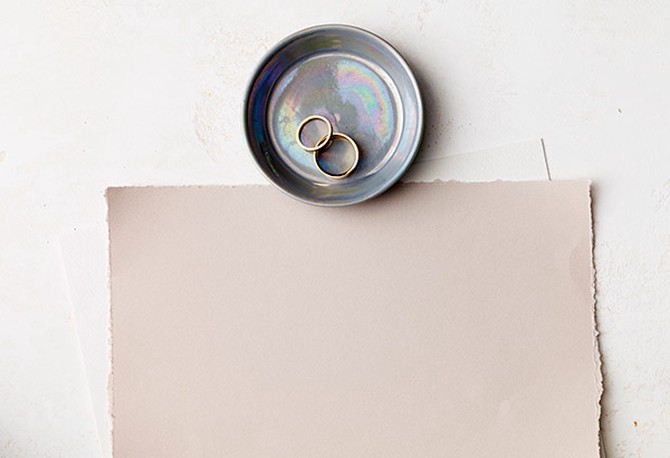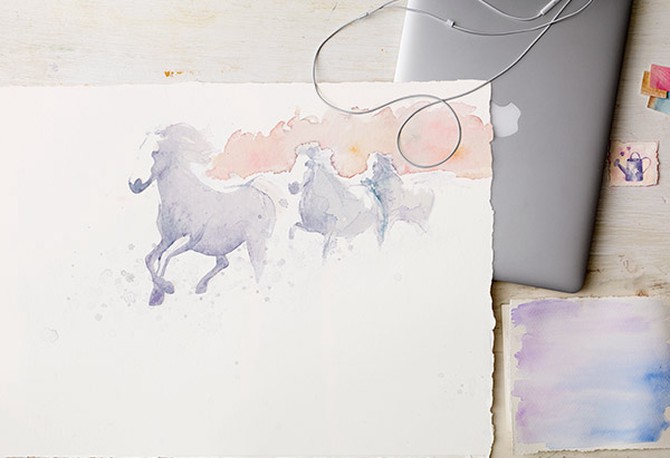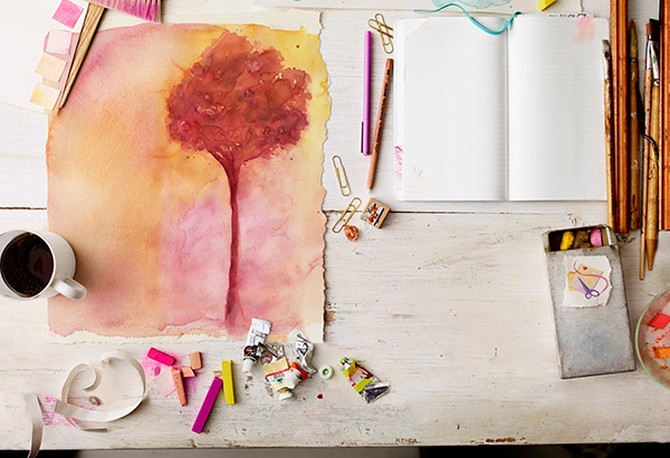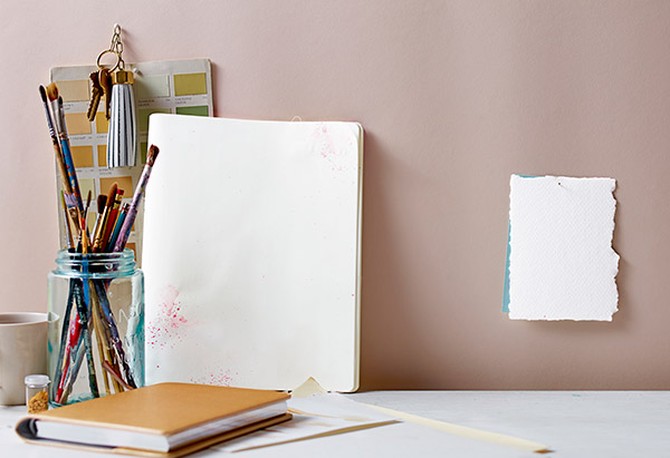7 Ways to Find Peace in a Crazy, Awful Moment
Whatever it is you're worrying about or stressing over can wait: Give us a few minutes and we'll help you fill them with a soul-recharging respite from everything that's got you frazzled.

Illustration: Rebekah Nichols, Photo: Johnny Miller
The Beauty of Now
Birdy, my 7-year-old daughter, was sitting on my lap in yet another doctor's office, cracking herself up about a recent Halloween party. "Remember that kid dressed up as a corpse?" she asked. "I thought he was going to look like trail mix. But when I saw him in those gross sheets, I realized I was thinking of gorp!" Her loony, snorting laugh echoed throughout the waiting room.
A few months earlier, while slathering Birdy with sunscreen, I'd discovered a lump on her torso. And so began a marathon diagnostic relay as Birdy was handed off from this specialist to that pediatric expert like a pigtailed baton. On medical charts, the lump was described as a "mass in the chest wall," and I felt like I had one, too—my heart knotted in preemptive grief. There were X-rays, ultrasounds, and a harrowing MRI, all to determine the substance and intentions of this mass. Bone? Soft tissue? Benign cyst? Malignant tumor? My fear of losing Birdy was like a deafening drumbeat that drowned out everything, including reason.
Then, sitting in that doctor's office, I heard her laugh, and somehow her cheer rang through, reminding me: There is this. There's really only ever this. In that moment, I realized I could terrify myself, imagining a future with no Birdy, or I could pine for the carefree, lump-free Birdy of the past—or I could be present for the real girl who was right in front of me and pay attention as her cheerfully unraveling braids bobbed against me and her little body shook with mirth. There were the hands that pet our cat as gently as you'd touch a soap bubble; there was the gap-toothed smile that made her look like a strangely radiant old man. When I promised her an ice cream cone after yet another sonogram, she couldn't believe her good fortune. Her energy reminded me that life isn't about avoiding trouble; it's about being present, even through the hard stuff, so you don't miss the very thing you're trying not to lose.
After two more months of loony, snorting laughter in waiting rooms—reading Amos & Boris together, me looking into her pink-cheeked little face—the doctors decided that Birdy's lump was just an enthusiastic growth of cartilage. Can you imagine the relief? Of course you can. You've had dark, scary times, too—the times you were sure you were losing your job, your friend, your love, your mind. And maybe through it all, you already knew that this moment is all we have. Me? I needed to learn it from Birdy.
—Catherine Newman is the author of the memoir Waiting for Birdy (Penguin).
A few months earlier, while slathering Birdy with sunscreen, I'd discovered a lump on her torso. And so began a marathon diagnostic relay as Birdy was handed off from this specialist to that pediatric expert like a pigtailed baton. On medical charts, the lump was described as a "mass in the chest wall," and I felt like I had one, too—my heart knotted in preemptive grief. There were X-rays, ultrasounds, and a harrowing MRI, all to determine the substance and intentions of this mass. Bone? Soft tissue? Benign cyst? Malignant tumor? My fear of losing Birdy was like a deafening drumbeat that drowned out everything, including reason.
Then, sitting in that doctor's office, I heard her laugh, and somehow her cheer rang through, reminding me: There is this. There's really only ever this. In that moment, I realized I could terrify myself, imagining a future with no Birdy, or I could pine for the carefree, lump-free Birdy of the past—or I could be present for the real girl who was right in front of me and pay attention as her cheerfully unraveling braids bobbed against me and her little body shook with mirth. There were the hands that pet our cat as gently as you'd touch a soap bubble; there was the gap-toothed smile that made her look like a strangely radiant old man. When I promised her an ice cream cone after yet another sonogram, she couldn't believe her good fortune. Her energy reminded me that life isn't about avoiding trouble; it's about being present, even through the hard stuff, so you don't miss the very thing you're trying not to lose.
After two more months of loony, snorting laughter in waiting rooms—reading Amos & Boris together, me looking into her pink-cheeked little face—the doctors decided that Birdy's lump was just an enthusiastic growth of cartilage. Can you imagine the relief? Of course you can. You've had dark, scary times, too—the times you were sure you were losing your job, your friend, your love, your mind. And maybe through it all, you already knew that this moment is all we have. Me? I needed to learn it from Birdy.
—Catherine Newman is the author of the memoir Waiting for Birdy (Penguin).

Illustration: Rebekah Nichols, Photo: Johnny Miller
The Ebb and Flow
I'd been taking a beating in the white water for nearly an hour without catching a single wave. Feeling rubbery and weak from fighting the surf, I was just about to give up and head for the beach when I saw a massive swell coming, and thought, "I'd better take it—"knowing that if I didn't, I'd get punched in the face by another wall of foamy water. I paddled harder and stood up before the sheer force of nature shot me forward like a rocket, down the face of a ten-foot wave.
As it propelled me to shore, I felt a sense of calm that I hadn't experienced in the two months since I'd suffered a miscarriage, on the morning of my 35th birthday. There had been spotting and cramping that sent me to the hospital, and before I knew it, no more baby. At the time, I was only five weeks along, but once you know you're pregnant, there's no taking it back—that feeling of looking forward, of investment, of dreaming about who this tiny person could be. As a pit of sadness formed deep within me, I scrambled to escape, plunging myself into demanding work projects and travel in hopes that I'd find peace in distraction. I didn't.
That is, until I was 200 meters from shore, alone. As the ever-shifting ocean rocked me, I felt cradled by the waves, each one a fresh opportunity to find beauty in the natural progression of things. It became the unexpected lesson of my surf trip off the northwest coast of Costa Rica: how to get back up after being knocked down, again and again.
When I returned home to San Francisco, I learned I was pregnant again. In our living room now hangs a photo of me coming down the face of that double-overhead wave, which my husband laughingly calls the moment of conception—and I realize that's exactly how it felt. It was the recognition of ebb and flow, and the need to always keep moving.
—Bonnie Tsui
As it propelled me to shore, I felt a sense of calm that I hadn't experienced in the two months since I'd suffered a miscarriage, on the morning of my 35th birthday. There had been spotting and cramping that sent me to the hospital, and before I knew it, no more baby. At the time, I was only five weeks along, but once you know you're pregnant, there's no taking it back—that feeling of looking forward, of investment, of dreaming about who this tiny person could be. As a pit of sadness formed deep within me, I scrambled to escape, plunging myself into demanding work projects and travel in hopes that I'd find peace in distraction. I didn't.
That is, until I was 200 meters from shore, alone. As the ever-shifting ocean rocked me, I felt cradled by the waves, each one a fresh opportunity to find beauty in the natural progression of things. It became the unexpected lesson of my surf trip off the northwest coast of Costa Rica: how to get back up after being knocked down, again and again.
When I returned home to San Francisco, I learned I was pregnant again. In our living room now hangs a photo of me coming down the face of that double-overhead wave, which my husband laughingly calls the moment of conception—and I realize that's exactly how it felt. It was the recognition of ebb and flow, and the need to always keep moving.
—Bonnie Tsui

Illustration: Rebekah Nichols, Photo: Johnny Miller
There's a Joke in There Somewhere
Five years ago, I had an awful, soul-sucking year: During the birth of my child, my body went into organ failure, to the point where the doctors told my husband, Jason, I had begun to die. Then my daughter, who was born weighing less than two pounds, spent three months in the hospital fighting for her life. Then, just 14 weeks after we brought her home, my youngest brother, who was 28, died in a car accident, a crash that ended with an explosion so total there was nothing left to bury.
After his funeral, I drove to the Himalayan Institute in Pennsylvania for a three-day Ayurvedic retreat meant to bring things back into balance. Thanks to 72 hours of vegetarian meals, yoga classes, and sessions with a holistic doctor, I returned home hopeful. But less than two weeks later, a chaplain from my local hospital called to inform me that my husband had been the victim of a hit-and-run. "Are you f—ing kidding me?" I shrieked.
At the hospital, when I saw his face, so bruised it was almost unrecognizable, I realized there was no right way to absorb this kind of pain. My life had become a cruel joke.
And yet. When Jason came home, he immediately began cracking wise. And that set the tone for how we regarded his situation: with levity and something like grace.
Him: "My arm hurts. Take your top off—it's the only thing that will help."
Me: "You got hit in a crosswalk at 7 A.M.? Dude, I think God smited you."
When a stranger asked how he broke his arm, he said: "Arm wrestling with my mother-in-law. I won."
We laughed every day, and despite all that we had endured, I was happy. I won't go so far as to say that his being run over was a gift. I will say that the accident reminded me how remarkable humor can be. My husband's laughter is like medicine. When times get tough, he finds the funny—and I just lean in for the joke.
—Veronica Chambers
After his funeral, I drove to the Himalayan Institute in Pennsylvania for a three-day Ayurvedic retreat meant to bring things back into balance. Thanks to 72 hours of vegetarian meals, yoga classes, and sessions with a holistic doctor, I returned home hopeful. But less than two weeks later, a chaplain from my local hospital called to inform me that my husband had been the victim of a hit-and-run. "Are you f—ing kidding me?" I shrieked.
At the hospital, when I saw his face, so bruised it was almost unrecognizable, I realized there was no right way to absorb this kind of pain. My life had become a cruel joke.
And yet. When Jason came home, he immediately began cracking wise. And that set the tone for how we regarded his situation: with levity and something like grace.
Him: "My arm hurts. Take your top off—it's the only thing that will help."
Me: "You got hit in a crosswalk at 7 A.M.? Dude, I think God smited you."
When a stranger asked how he broke his arm, he said: "Arm wrestling with my mother-in-law. I won."
We laughed every day, and despite all that we had endured, I was happy. I won't go so far as to say that his being run over was a gift. I will say that the accident reminded me how remarkable humor can be. My husband's laughter is like medicine. When times get tough, he finds the funny—and I just lean in for the joke.
—Veronica Chambers

Illustration: Rebekah Nichols, Photo: Johnny Miller
Ride It Out
I come from a long line of worriers. It's in my blood. My grandfather Sam fretted ceaselessly—about money, security, status, the future of his only granddaughter. When I quit my government job (with its regular hours, pay raises, and benefits) to pursue a creative writing degree, Sam, who'd lived through the Depression, clutched at his balding head and wailed. When I broke up with my Jewish boyfriend before he went to law school, Sam nearly collapsed in grief. When I decided to buy a 100-year-old house, he howled, "What about the roof? What will you do about the roof?"
In truth, that roof did stress me out. I didn't want to end up like Sam, though; despite all his worry—meant, presumably, to keep crisis at bay—he was unable to ever find peace. But a few years ago, after my mother died and I lost a big job, my anxieties nearly overwhelmed me. I tried exercise, relaxation tapes, therapy, time with my dog, time with friends, time with Xanax. They helped, but on my worst days, I retreated to the life raft of worry.
Then I had the good fortune of being asked to do an artist's residency at a dude ranch in Wyoming. I had gone horseback riding a few times as a kid, though never with any seriousness. ("Horses!" I can imagine Sam screeching, shaking his head so hard bits of spittle would fly. "You would have to be out of your mind!") But after two weeks of watching the horses (the artists weren't allowed to ride them), I managed to beg my way onto one. It was only a trail ride, and I had terrible form—I clung to the saddle and threw my weight around awkwardly—but I felt something stirring in my gut. On horseback, the stronghold of my worries loosened, because I was moving so fast I couldn't think. I could only feel—the animal running, the sky touching my face, the fingers of wind in my hair. It felt like a release. It felt right.
When I returned home to Oregon after the residency, I found a barn and a trainer (upbeat, not at all anxious), and before long, I was cantering bareback and learning to train troubled horses. My favorite is a retired Thoroughbred named Jake, a chestnut gelding with liquid Disney eyes. Jake can move fast, and when he does, I feel myself slide into myself, like a penny into a slot. I lean in and that horse keeps going, faster and faster until he's practically flying and I am totally inside myself and unthinking. I am simply there.
"You are going to break your neck!" I can hear Sam warn. But I can't worry about that. Worry isn't safe. In fact, at the barn, where horses spook at the first signs of trouble, worry shows itself for what it is: a liability. Horses value calm above all other virtues. I'm new to their world, but it turns out I share their values.
Robin Romm is the author of the memoir The Mercy Papers (Scribner).
In truth, that roof did stress me out. I didn't want to end up like Sam, though; despite all his worry—meant, presumably, to keep crisis at bay—he was unable to ever find peace. But a few years ago, after my mother died and I lost a big job, my anxieties nearly overwhelmed me. I tried exercise, relaxation tapes, therapy, time with my dog, time with friends, time with Xanax. They helped, but on my worst days, I retreated to the life raft of worry.
Then I had the good fortune of being asked to do an artist's residency at a dude ranch in Wyoming. I had gone horseback riding a few times as a kid, though never with any seriousness. ("Horses!" I can imagine Sam screeching, shaking his head so hard bits of spittle would fly. "You would have to be out of your mind!") But after two weeks of watching the horses (the artists weren't allowed to ride them), I managed to beg my way onto one. It was only a trail ride, and I had terrible form—I clung to the saddle and threw my weight around awkwardly—but I felt something stirring in my gut. On horseback, the stronghold of my worries loosened, because I was moving so fast I couldn't think. I could only feel—the animal running, the sky touching my face, the fingers of wind in my hair. It felt like a release. It felt right.
When I returned home to Oregon after the residency, I found a barn and a trainer (upbeat, not at all anxious), and before long, I was cantering bareback and learning to train troubled horses. My favorite is a retired Thoroughbred named Jake, a chestnut gelding with liquid Disney eyes. Jake can move fast, and when he does, I feel myself slide into myself, like a penny into a slot. I lean in and that horse keeps going, faster and faster until he's practically flying and I am totally inside myself and unthinking. I am simply there.
"You are going to break your neck!" I can hear Sam warn. But I can't worry about that. Worry isn't safe. In fact, at the barn, where horses spook at the first signs of trouble, worry shows itself for what it is: a liability. Horses value calm above all other virtues. I'm new to their world, but it turns out I share their values.
Robin Romm is the author of the memoir The Mercy Papers (Scribner).

Illustration: The Selby
The Laugh Track
A cross-country move from New York to Portland would probably be stressful for anyone—but it's especially hard if you're the security-loving type who relies on order and routine to stay sane. My solution? 30 Rock. Liz Lemon's goofy discomfort with everything and everyone around her gave me relief from the hell of packing as my family's apartment was transformed into a cardboard-box forest of despair. I burned through six seasons in a week.
Then we got to Portland. A storm delayed our moving truck two weeks. We had to buy a car, choose childcare for our 1-year-old, and figure out our new city (fun fact: Portland requires four types of garbage bins!). As a reward for getting through another day, I would nestle onto our sagging air mattress and feel the tension drain as 30 Rock's familiar boppy theme song began. I may not know which trash can is for coffee grounds, but I know Liz. If she can face tomorrow with a crooked smile, so can I.
— Sunny Sea Gold is the author of Food: The Good Girl's Drug (Berkley).
Then we got to Portland. A storm delayed our moving truck two weeks. We had to buy a car, choose childcare for our 1-year-old, and figure out our new city (fun fact: Portland requires four types of garbage bins!). As a reward for getting through another day, I would nestle onto our sagging air mattress and feel the tension drain as 30 Rock's familiar boppy theme song began. I may not know which trash can is for coffee grounds, but I know Liz. If she can face tomorrow with a crooked smile, so can I.
— Sunny Sea Gold is the author of Food: The Good Girl's Drug (Berkley).

Illustration: Rebekah Nichols, Photo: Johnny Miller
The Giving Tree
When the weather turns cold, Madison, Wisconsin, can become eerily desolate. On one of those frigid, lonely days of wandering the Wempty streets, I headed for a nature preserve, not far from my snug little house, that I'd never bothered to visit before. I'm still glad for that change of course. Because there, in a clearing, I discovered a giant white oak tree so dazzling, so crazily beautiful, I actually chortled with delight at the sight of it.
At least 200 years old, the oak has branches that span more than 50 feet, outstretched like arms—and eye- and ear-like knobs high on the trunk—that give it an unmistakably human vibe. That first time I saw the oak, I crept through the thick underbrush, wrapped my arms around its trunk, and, in gratitude for the way it made me laugh, rested my cheek on its scratchy warm bark.
The tree reminded me, in its wind-swept solidity, that I have plenty of resilience in me, too. Now I visit the oak on days I'm feeling wigged out—like when a friend died and my tears liquefied the moss buried in the bark, or when I've picked a fight with my husband over, alas, the right way to clean the stovetop (when what's really bothering me is a churning, anxious desire to connect with him). After a visit to the tree, I can go back and ask my husband for what I truly need. The oak's majestic strength quietly reminds me to press on.
—Louisa Kamps has written for Elle and The New Yorker.
At least 200 years old, the oak has branches that span more than 50 feet, outstretched like arms—and eye- and ear-like knobs high on the trunk—that give it an unmistakably human vibe. That first time I saw the oak, I crept through the thick underbrush, wrapped my arms around its trunk, and, in gratitude for the way it made me laugh, rested my cheek on its scratchy warm bark.
The tree reminded me, in its wind-swept solidity, that I have plenty of resilience in me, too. Now I visit the oak on days I'm feeling wigged out—like when a friend died and my tears liquefied the moss buried in the bark, or when I've picked a fight with my husband over, alas, the right way to clean the stovetop (when what's really bothering me is a churning, anxious desire to connect with him). After a visit to the tree, I can go back and ask my husband for what I truly need. The oak's majestic strength quietly reminds me to press on.
—Louisa Kamps has written for Elle and The New Yorker.

Photo: Johnny Miller
The Five-Moment Memoir
Journal entry from February 2, 2012
• Bonded with woman on the train over our mutual aversion to Fifty Shades of Grey
• Got lost in Manhattan, man dressed as Statue of Liberty gave me directions
• Cute guy across the hall helped me carry groceries up three flights of stairs
• Applied for six jobs
• Rained in our kitchen, handyman patched roof with garbage bag
I was in my fourth month of unemployment when I wrote that list. I had next to no money, and not much of a roof. Needing something therapeutic, and without the funds for a deep-tissue massage, I reached for my journal. That was the beginning of what I call my five-moment memoir. Every day I force myself to write down five things that have happened—the highlights and low-lights. Limiting myself to five lets me recount enough to ruminate and decompress. As the stress leaks out of me and onto the page, my problems begin to seem more manageable. Hope replaces fear, and productivity replaces despair, because as bottomed-out as I feel on any given day, the pages show determination—and a story in progress.
—Sarah Beauchamp is a freelance writer in New York City.
Next: 7 things every exhausted woman should do for herself
• Bonded with woman on the train over our mutual aversion to Fifty Shades of Grey
• Got lost in Manhattan, man dressed as Statue of Liberty gave me directions
• Cute guy across the hall helped me carry groceries up three flights of stairs
• Applied for six jobs
• Rained in our kitchen, handyman patched roof with garbage bag
I was in my fourth month of unemployment when I wrote that list. I had next to no money, and not much of a roof. Needing something therapeutic, and without the funds for a deep-tissue massage, I reached for my journal. That was the beginning of what I call my five-moment memoir. Every day I force myself to write down five things that have happened—the highlights and low-lights. Limiting myself to five lets me recount enough to ruminate and decompress. As the stress leaks out of me and onto the page, my problems begin to seem more manageable. Hope replaces fear, and productivity replaces despair, because as bottomed-out as I feel on any given day, the pages show determination—and a story in progress.
—Sarah Beauchamp is a freelance writer in New York City.
Next: 7 things every exhausted woman should do for herself
From the February 2013 issue of O, The Oprah Magazine

